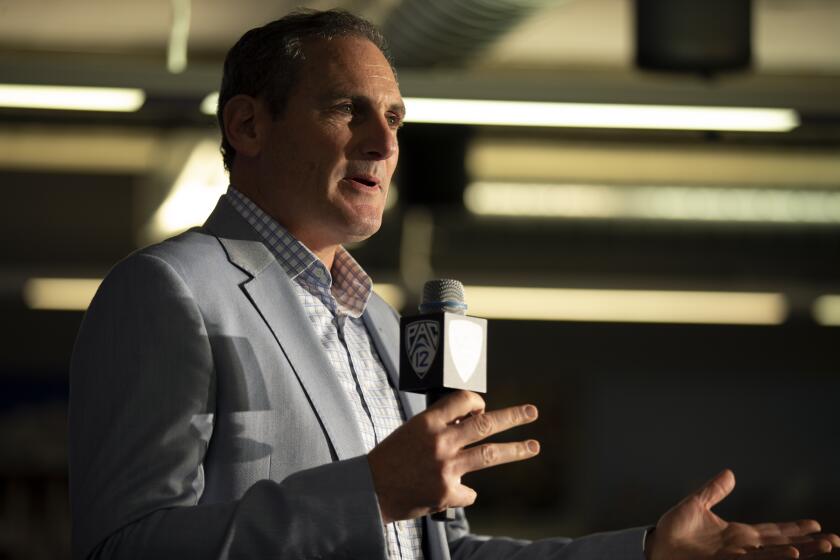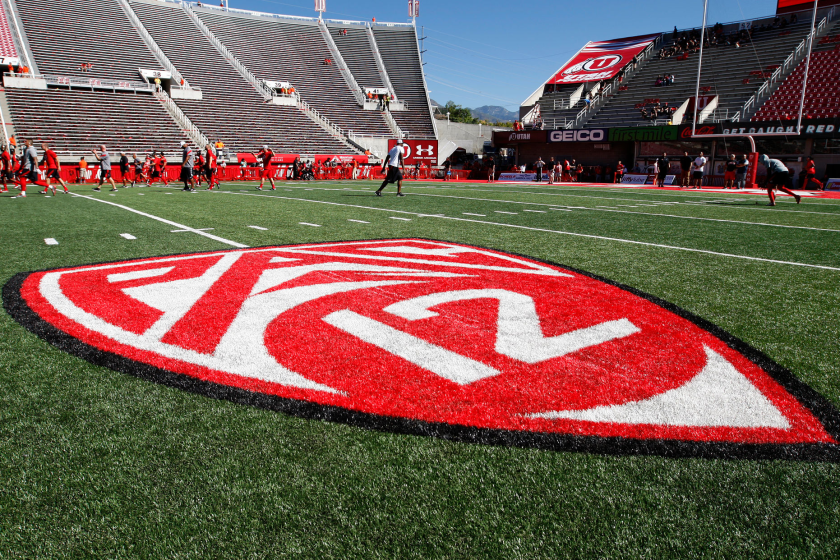Discussions ‘need to be had.’ How UCLA’s Black Student-Athlete Alliance seeks change
- Share via
From needing to “stick to sports” to “it’s just too difficult,” Abbey Forbes has heard every reason why she shouldn’t talk about race. To the UCLA women’s tennis player, those pale in comparison to the reason why she should.
“When you cannot take the color off of your skin, another person should not have the right to say that they cannot talk about it because it makes them uncomfortable,” said Forbes, an All-American. “I think that it is time for us to have these uncomfortable conversations.”
The UCLA Black Student-Athlete Alliance (BSAA) aims to lead those conversations. After months of quietly working, the club that’s part group therapy, part activist organization went on social media in August to lay out its mission to be a safe space for Black athletes on campus. One goal is to discuss and learn from their experiences, then turn them into action they hope can shift the culture at UCLA and beyond.
“If you have education without action or you have action without education, it’s not really bringing everything together,” said UCLA associate athletic director Kenny Donaldson, who advises members of the BSAA. “I think this group is looking to bring in the educational piece as well as the action piece.”
Donaldson, a UCLA alumnus, returned to the athletic department in November after previously working as an academic advisor to the basketball teams from 2003-10. Responsible for overseeing the equity, diversity and inclusion committee, Donaldson quickly began working with athletes on Black History Month initiatives.
Pac-12 Commissioner Larry Scott says a new partnership will allow coronavirus testing results in 15 minutes, but will that mean football before Jan. 1?
Lauryn Miller, a forward on the women’s basketball team, designed a T-shirt for the event, and with Donaldson’s help, they expanded the plan to include a Black History Month panel with current athletes and added an exhibit in the UCLA Athletics Hall of Fame that honored former Bruin athlete activists.
The group of about five to seven athletes who were working closely with Donaldson has grown to more than 20 across 11 sports, he said.
For those coming from the football or basketball programs, which practice, lift and meet in their own private facilities, the meetings are some of their first interactions with athletes from other sports. Together, the athletes find strength in their community as Black athletes at UCLA. They are a “minority of the minority,” said Michaela Onyenwere, a forward on the women’s basketball team.
It’s also eye-opening for Onyenwere. The senior is one of six Black players on the 14-person UCLA roster for the upcoming season and feels fortunate to have had positive discussions about race in America with her team. But she’s seen that not all her fellow Bruins had the same experiences during their athletic careers. For some, like Forbes, who is one of two Black players on her team, it can be related to each sport’s demographic.
“I love the sport of tennis and it has gotten me to where I am,” said Forbes, a sophomore. “However, the fact that it is a predominantly white sport means that it also comes with a lot of people who are not educated on race, racial discrimination, America’s history with racism.”
“These things don’t go away. It’s not going to go away in a day, a year, it’s not going to go away so these conversations need to be had.”
— Michaela Onyenwere, UCLA basketball player
Forbes was one of the best players on the juniors circuit, winning the 2019 juniors doubles title at Wimbledon and playing in the 2019 U.S. Open by virtue of winning the doubles title at the USTA girls under-18 national championship. But growing up in North Carolina, she also saw the “roughest of the rough.”
A white male called her the N-word. The Confederate flag flew freely. The numerous side-eye looks or curt remarks from fellow players, other parents and referees at tournaments seemed so small by comparison that she became numb to the microaggressions.
But coming to UCLA, where she had Jada Hart, a redshirt senior who is also part of the BSAA, and assistant coach Rance Brown, who is also Black, Forbes knew she had a small community within her team. George Floyd’s death while in Minneapolis police custody in May made Forbes realize she needed a bigger one.
Angered by the video circulated on social media, Forbes wanted to talk about it, but, wanting to respect the mental health of her teammates and coaches, didn’t feel it was fair to bring it up in a group setting. She confided in Donaldson and found other athletes who felt the same way.
The BSAA support network extends beyond just athletes as Donaldson helps connect the group to athletic directors and professors. One of their first discussions was with Martin Jarmond, who started his post as UCLA’s athletic director in July. They’ve also spoken with UC Riverside’s Tamica Smith Jones. She was one of just eight Black women who held Division I athletic director positions in 2019, according to the NCAA.
The guests are trailblazers in a similar way to the young athletes hoping to open greater conversations about race on their campus.
“That gives us confidence to continue to do what we’re doing even if there are people who don’t agree with us,” Onyenwere said.
The Pac-12 Conference has had preliminary discussions about potentially holding a six- or eight-game college football season that would start in January.
Defensive lineman Odua Isibor said the group hopes to help UCLA be more proactive in tackling racial injustice instead of waiting for the next tragic incident to issue a statement and pledge to work for change. The BSAA’s plans include outreach events for children in underserved communities and ways to better unify Black athletes with Black students on campus. There are discussions about a mentorship program pairing incoming Black athletes with seniors. Setting up a path to success for future Black Bruins is Forbes’ main hope for the group.
The BSAA hopes to implement mandatory conversations about race among teams and coaches as well as how the experience of Black athletes can be improved. And not just a quick chat once a year, Onyenwere said, but more regularly.
“These things don’t go away,” Onyenwere said. “It’s not going to go away in a day, a year, it’s not going to go away so these conversations need to be had.”
As a student and during his first stint at UCLA, Donaldson noticed a different dynamic among Black athletes. Back then, he saw how they didn’t speak out, fearing retribution from coaches or teammates. Seeing the faces of the athletes today who check into biweekly virtual meetings, determined to create a better space for those who will come after them, reminds Donaldson of the reason why he returned to his alma mater.
“Each time I meet with this group, it’s like my little jolt of energy,” Donaldson said, “like wow, this is why I got into athletics.”
More to Read
Go beyond the scoreboard
Get the latest on L.A.'s teams in the daily Sports Report newsletter.
You may occasionally receive promotional content from the Los Angeles Times.









